Business Law: Nature, Sources, Impact on Business Operations and Dispute Resolution Solutions
VerifiedAdded on 2023/06/05
|14
|4656
|428
AI Summary
This article discusses the nature and sources of business law in the UK, including the role of the government in making laws, the impact of laws on business operations, and dispute resolution solutions. It also covers the formation of different types of business organizations and their advantages and disadvantages.
Contribute Materials
Your contribution can guide someone’s learning journey. Share your
documents today.
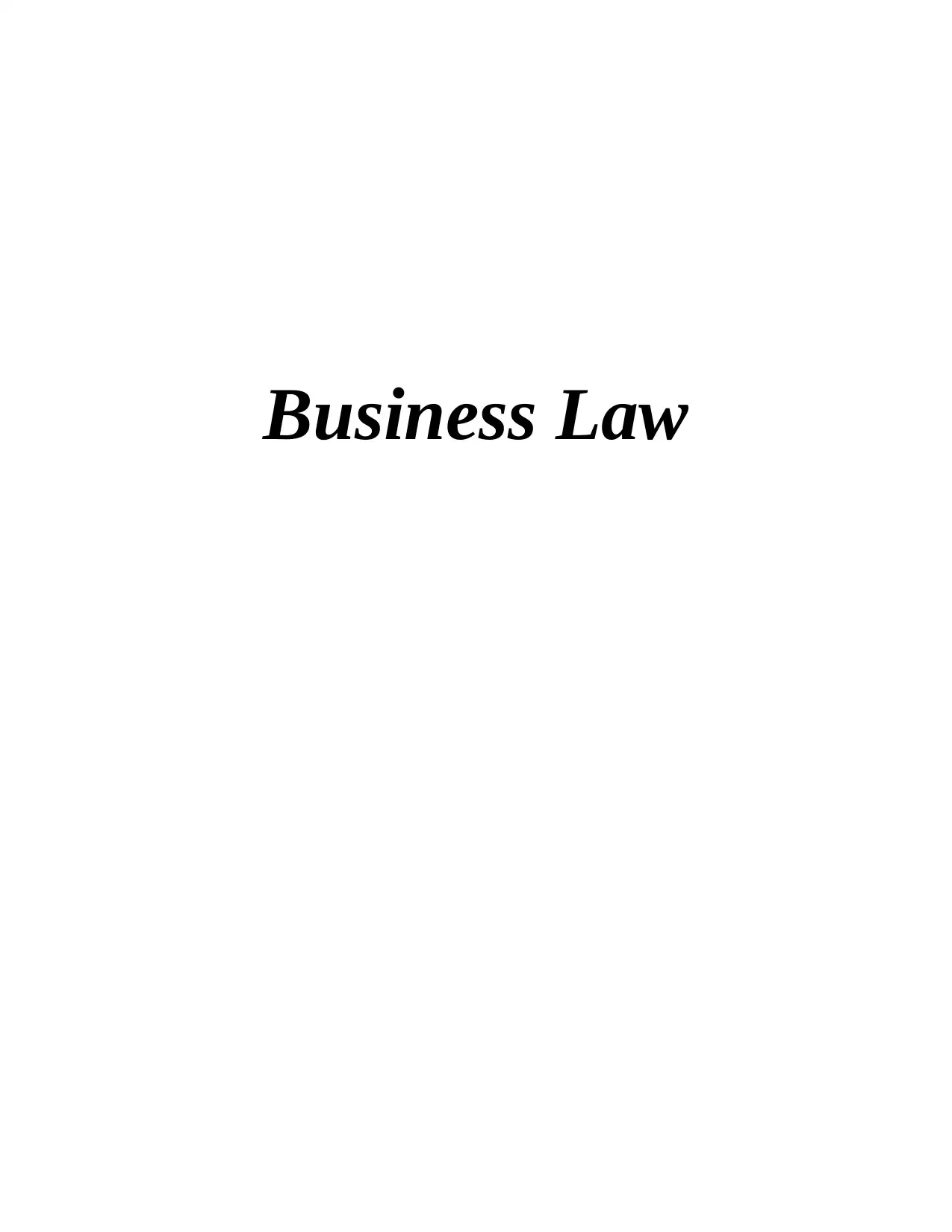
Business Law
Secure Best Marks with AI Grader
Need help grading? Try our AI Grader for instant feedback on your assignments.
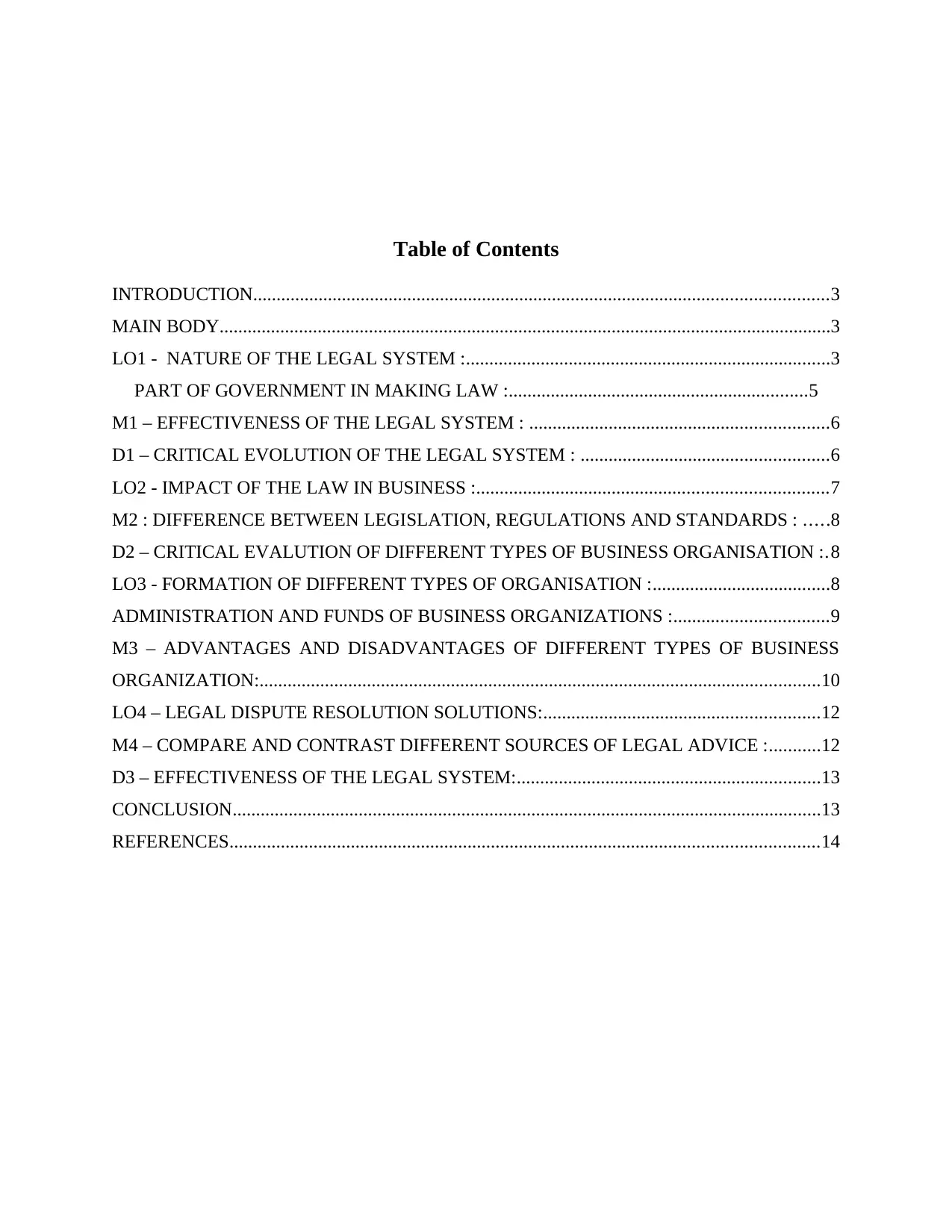
Table of Contents
INTRODUCTION...........................................................................................................................3
MAIN BODY...................................................................................................................................3
LO1 - NATURE OF THE LEGAL SYSTEM :..............................................................................3
PART OF GOVERNMENT IN MAKING LAW :................................................................5
M1 – EFFECTIVENESS OF THE LEGAL SYSTEM : ................................................................6
D1 – CRITICAL EVOLUTION OF THE LEGAL SYSTEM : .....................................................6
LO2 - IMPACT OF THE LAW IN BUSINESS :...........................................................................7
M2 : DIFFERENCE BETWEEN LEGISLATION, REGULATIONS AND STANDARDS : .....8
D2 – CRITICAL EVALUTION OF DIFFERENT TYPES OF BUSINESS ORGANISATION :.8
LO3 - FORMATION OF DIFFERENT TYPES OF ORGANISATION :......................................8
ADMINISTRATION AND FUNDS OF BUSINESS ORGANIZATIONS :.................................9
M3 – ADVANTAGES AND DISADVANTAGES OF DIFFERENT TYPES OF BUSINESS
ORGANIZATION:........................................................................................................................10
LO4 – LEGAL DISPUTE RESOLUTION SOLUTIONS:...........................................................12
M4 – COMPARE AND CONTRAST DIFFERENT SOURCES OF LEGAL ADVICE :...........12
D3 – EFFECTIVENESS OF THE LEGAL SYSTEM:.................................................................13
CONCLUSION..............................................................................................................................13
REFERENCES..............................................................................................................................14
INTRODUCTION...........................................................................................................................3
MAIN BODY...................................................................................................................................3
LO1 - NATURE OF THE LEGAL SYSTEM :..............................................................................3
PART OF GOVERNMENT IN MAKING LAW :................................................................5
M1 – EFFECTIVENESS OF THE LEGAL SYSTEM : ................................................................6
D1 – CRITICAL EVOLUTION OF THE LEGAL SYSTEM : .....................................................6
LO2 - IMPACT OF THE LAW IN BUSINESS :...........................................................................7
M2 : DIFFERENCE BETWEEN LEGISLATION, REGULATIONS AND STANDARDS : .....8
D2 – CRITICAL EVALUTION OF DIFFERENT TYPES OF BUSINESS ORGANISATION :.8
LO3 - FORMATION OF DIFFERENT TYPES OF ORGANISATION :......................................8
ADMINISTRATION AND FUNDS OF BUSINESS ORGANIZATIONS :.................................9
M3 – ADVANTAGES AND DISADVANTAGES OF DIFFERENT TYPES OF BUSINESS
ORGANIZATION:........................................................................................................................10
LO4 – LEGAL DISPUTE RESOLUTION SOLUTIONS:...........................................................12
M4 – COMPARE AND CONTRAST DIFFERENT SOURCES OF LEGAL ADVICE :...........12
D3 – EFFECTIVENESS OF THE LEGAL SYSTEM:.................................................................13
CONCLUSION..............................................................................................................................13
REFERENCES..............................................................................................................................14

INTRODUCTION
The united kingdom has contained more than a one division governance nation where
individual have posses various rights, rules and remedies by their legislation. For the in-depth
understanding of this mentioned topic, we will discussed about the characteristics of the United
Kingdom legal system and their sources of law, the involvement of the government in the
making of the law, the influence of various laws on the business operations on the organisation
along with their management and in also will discuss about the funding solutions in respect to
solve the problem out-of-doors of the court of law. That makes them diverse in nature which
makes them elated to do alteration or formulation in the new laws of the nation. In regard to the
business houses, the law of business is plays a very crucial role. It laid down the rules and
regulations for performing the various task in regard of businesses and discharge all the legal
operations. Each and every year the royal queen of the United Kingdom has been continuously
given a soothing speech on the event of the annual assessment of the ruling government
programmes. That speech known as the 'speech from throne', which also consist the guidelines
and aid the legal authority a sign to must abide the law in a correct way.
MAIN BODY
TASK
LO1 - NATURE OF THE LEGAL SYSTEM :
The United Kingdom has consisted four nations such as England and Wales, Scotland
and the Northern Ireland. In addition to that each one has their separate jurisdiction and their
individual courts which has been derived from the parliament act and statutory instruments. All
the courts of the different nations has been holding different jurisdictions and they can decide the
issues in accordingly with their regulation of their courtrooms but all the appeal in regarding to
the cases will only be decided by the United Nations Supreme Courts. The nations legal system
is doing great and still they don't have the written constitution because their queen is the head of
the nation but all every important authority has been posses by the nations government which has
the carry all the executionary power. Since the labour government has came into the power, they
have made important constitutional reforms. Right after the labour government came into the
power, they immediately started a procedure of dispersal i.e. transferring or shifting into the
The united kingdom has contained more than a one division governance nation where
individual have posses various rights, rules and remedies by their legislation. For the in-depth
understanding of this mentioned topic, we will discussed about the characteristics of the United
Kingdom legal system and their sources of law, the involvement of the government in the
making of the law, the influence of various laws on the business operations on the organisation
along with their management and in also will discuss about the funding solutions in respect to
solve the problem out-of-doors of the court of law. That makes them diverse in nature which
makes them elated to do alteration or formulation in the new laws of the nation. In regard to the
business houses, the law of business is plays a very crucial role. It laid down the rules and
regulations for performing the various task in regard of businesses and discharge all the legal
operations. Each and every year the royal queen of the United Kingdom has been continuously
given a soothing speech on the event of the annual assessment of the ruling government
programmes. That speech known as the 'speech from throne', which also consist the guidelines
and aid the legal authority a sign to must abide the law in a correct way.
MAIN BODY
TASK
LO1 - NATURE OF THE LEGAL SYSTEM :
The United Kingdom has consisted four nations such as England and Wales, Scotland
and the Northern Ireland. In addition to that each one has their separate jurisdiction and their
individual courts which has been derived from the parliament act and statutory instruments. All
the courts of the different nations has been holding different jurisdictions and they can decide the
issues in accordingly with their regulation of their courtrooms but all the appeal in regarding to
the cases will only be decided by the United Nations Supreme Courts. The nations legal system
is doing great and still they don't have the written constitution because their queen is the head of
the nation but all every important authority has been posses by the nations government which has
the carry all the executionary power. Since the labour government has came into the power, they
have made important constitutional reforms. Right after the labour government came into the
power, they immediately started a procedure of dispersal i.e. transferring or shifting into the
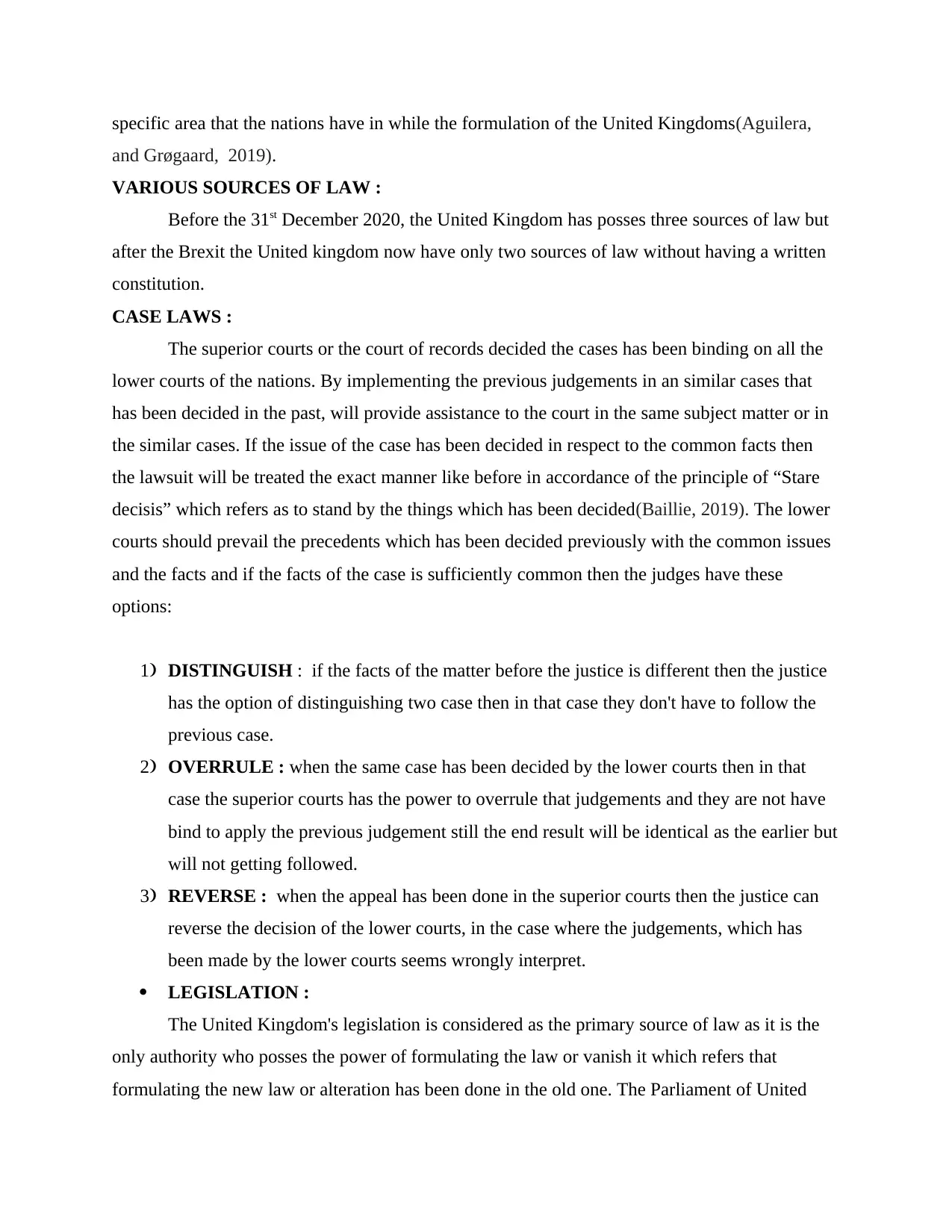
specific area that the nations have in while the formulation of the United Kingdoms(Aguilera,
and Grøgaard, 2019).
VARIOUS SOURCES OF LAW :
Before the 31st December 2020, the United Kingdom has posses three sources of law but
after the Brexit the United kingdom now have only two sources of law without having a written
constitution.
CASE LAWS :
The superior courts or the court of records decided the cases has been binding on all the
lower courts of the nations. By implementing the previous judgements in an similar cases that
has been decided in the past, will provide assistance to the court in the same subject matter or in
the similar cases. If the issue of the case has been decided in respect to the common facts then
the lawsuit will be treated the exact manner like before in accordance of the principle of “Stare
decisis” which refers as to stand by the things which has been decided(Baillie, 2019). The lower
courts should prevail the precedents which has been decided previously with the common issues
and the facts and if the facts of the case is sufficiently common then the judges have these
options:
1) DISTINGUISH : if the facts of the matter before the justice is different then the justice
has the option of distinguishing two case then in that case they don't have to follow the
previous case.
2) OVERRULE : when the same case has been decided by the lower courts then in that
case the superior courts has the power to overrule that judgements and they are not have
bind to apply the previous judgement still the end result will be identical as the earlier but
will not getting followed.
3) REVERSE : when the appeal has been done in the superior courts then the justice can
reverse the decision of the lower courts, in the case where the judgements, which has
been made by the lower courts seems wrongly interpret.
LEGISLATION :
The United Kingdom's legislation is considered as the primary source of law as it is the
only authority who posses the power of formulating the law or vanish it which refers that
formulating the new law or alteration has been done in the old one. The Parliament of United
and Grøgaard, 2019).
VARIOUS SOURCES OF LAW :
Before the 31st December 2020, the United Kingdom has posses three sources of law but
after the Brexit the United kingdom now have only two sources of law without having a written
constitution.
CASE LAWS :
The superior courts or the court of records decided the cases has been binding on all the
lower courts of the nations. By implementing the previous judgements in an similar cases that
has been decided in the past, will provide assistance to the court in the same subject matter or in
the similar cases. If the issue of the case has been decided in respect to the common facts then
the lawsuit will be treated the exact manner like before in accordance of the principle of “Stare
decisis” which refers as to stand by the things which has been decided(Baillie, 2019). The lower
courts should prevail the precedents which has been decided previously with the common issues
and the facts and if the facts of the case is sufficiently common then the judges have these
options:
1) DISTINGUISH : if the facts of the matter before the justice is different then the justice
has the option of distinguishing two case then in that case they don't have to follow the
previous case.
2) OVERRULE : when the same case has been decided by the lower courts then in that
case the superior courts has the power to overrule that judgements and they are not have
bind to apply the previous judgement still the end result will be identical as the earlier but
will not getting followed.
3) REVERSE : when the appeal has been done in the superior courts then the justice can
reverse the decision of the lower courts, in the case where the judgements, which has
been made by the lower courts seems wrongly interpret.
LEGISLATION :
The United Kingdom's legislation is considered as the primary source of law as it is the
only authority who posses the power of formulating the law or vanish it which refers that
formulating the new law or alteration has been done in the old one. The Parliament of United
Secure Best Marks with AI Grader
Need help grading? Try our AI Grader for instant feedback on your assignments.
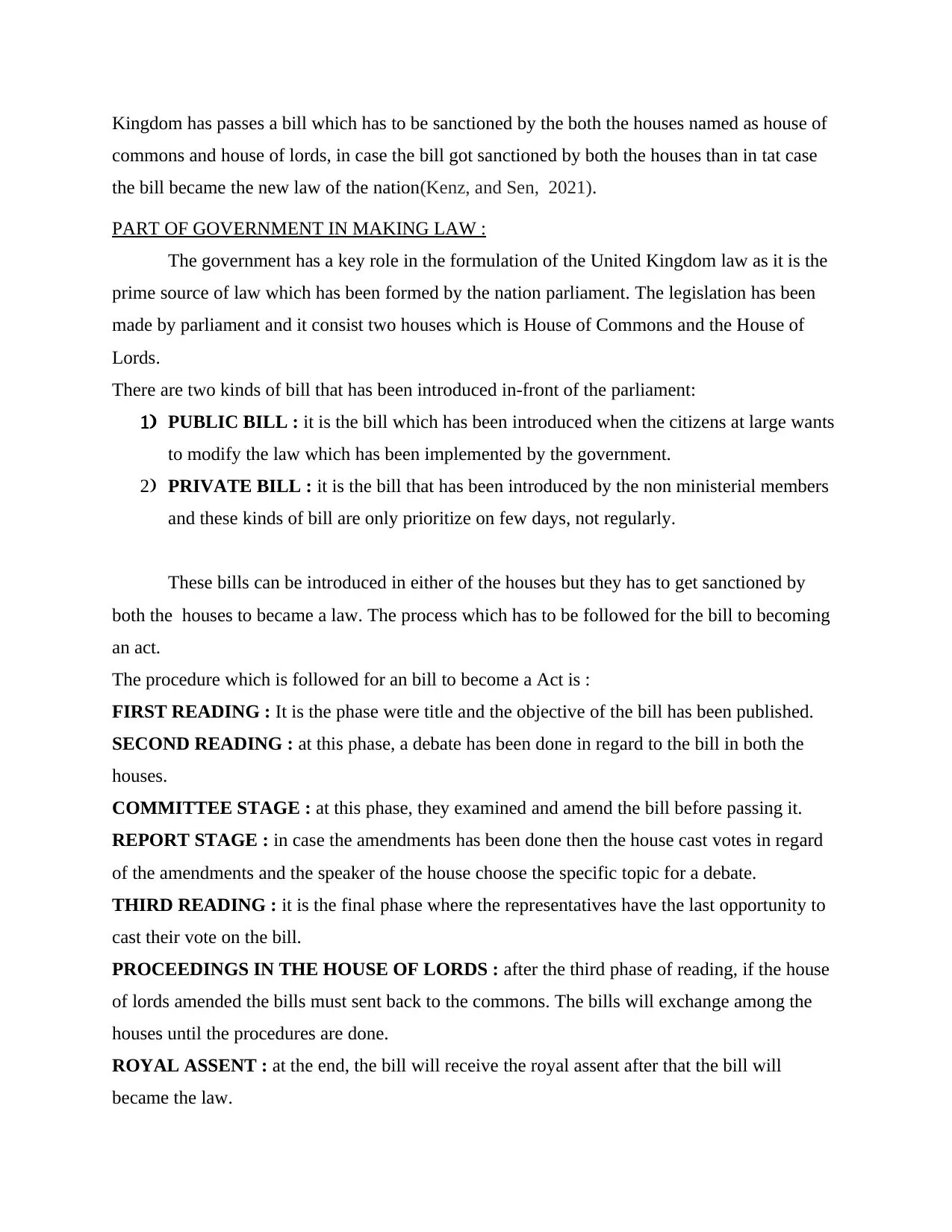
Kingdom has passes a bill which has to be sanctioned by the both the houses named as house of
commons and house of lords, in case the bill got sanctioned by both the houses than in tat case
the bill became the new law of the nation(Kenz, and Sen, 2021).
PART OF GOVERNMENT IN MAKING LAW :
The government has a key role in the formulation of the United Kingdom law as it is the
prime source of law which has been formed by the nation parliament. The legislation has been
made by parliament and it consist two houses which is House of Commons and the House of
Lords.
There are two kinds of bill that has been introduced in-front of the parliament:
1) PUBLIC BILL : it is the bill which has been introduced when the citizens at large wants
to modify the law which has been implemented by the government.
2) PRIVATE BILL : it is the bill that has been introduced by the non ministerial members
and these kinds of bill are only prioritize on few days, not regularly.
These bills can be introduced in either of the houses but they has to get sanctioned by
both the houses to became a law. The process which has to be followed for the bill to becoming
an act.
The procedure which is followed for an bill to become a Act is :
FIRST READING : It is the phase were title and the objective of the bill has been published.
SECOND READING : at this phase, a debate has been done in regard to the bill in both the
houses.
COMMITTEE STAGE : at this phase, they examined and amend the bill before passing it.
REPORT STAGE : in case the amendments has been done then the house cast votes in regard
of the amendments and the speaker of the house choose the specific topic for a debate.
THIRD READING : it is the final phase where the representatives have the last opportunity to
cast their vote on the bill.
PROCEEDINGS IN THE HOUSE OF LORDS : after the third phase of reading, if the house
of lords amended the bills must sent back to the commons. The bills will exchange among the
houses until the procedures are done.
ROYAL ASSENT : at the end, the bill will receive the royal assent after that the bill will
became the law.
commons and house of lords, in case the bill got sanctioned by both the houses than in tat case
the bill became the new law of the nation(Kenz, and Sen, 2021).
PART OF GOVERNMENT IN MAKING LAW :
The government has a key role in the formulation of the United Kingdom law as it is the
prime source of law which has been formed by the nation parliament. The legislation has been
made by parliament and it consist two houses which is House of Commons and the House of
Lords.
There are two kinds of bill that has been introduced in-front of the parliament:
1) PUBLIC BILL : it is the bill which has been introduced when the citizens at large wants
to modify the law which has been implemented by the government.
2) PRIVATE BILL : it is the bill that has been introduced by the non ministerial members
and these kinds of bill are only prioritize on few days, not regularly.
These bills can be introduced in either of the houses but they has to get sanctioned by
both the houses to became a law. The process which has to be followed for the bill to becoming
an act.
The procedure which is followed for an bill to become a Act is :
FIRST READING : It is the phase were title and the objective of the bill has been published.
SECOND READING : at this phase, a debate has been done in regard to the bill in both the
houses.
COMMITTEE STAGE : at this phase, they examined and amend the bill before passing it.
REPORT STAGE : in case the amendments has been done then the house cast votes in regard
of the amendments and the speaker of the house choose the specific topic for a debate.
THIRD READING : it is the final phase where the representatives have the last opportunity to
cast their vote on the bill.
PROCEEDINGS IN THE HOUSE OF LORDS : after the third phase of reading, if the house
of lords amended the bills must sent back to the commons. The bills will exchange among the
houses until the procedures are done.
ROYAL ASSENT : at the end, the bill will receive the royal assent after that the bill will
became the law.
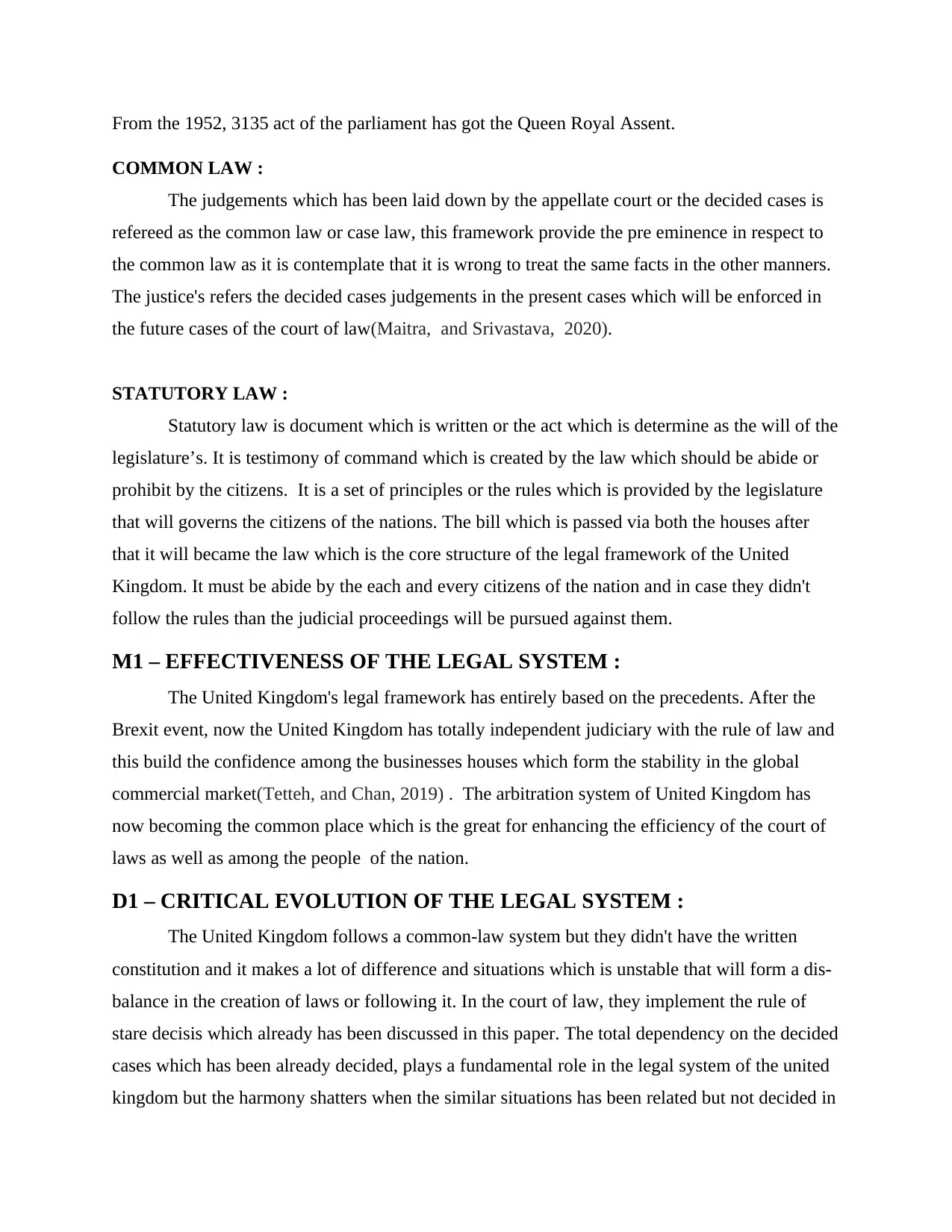
From the 1952, 3135 act of the parliament has got the Queen Royal Assent.
COMMON LAW :
The judgements which has been laid down by the appellate court or the decided cases is
refereed as the common law or case law, this framework provide the pre eminence in respect to
the common law as it is contemplate that it is wrong to treat the same facts in the other manners.
The justice's refers the decided cases judgements in the present cases which will be enforced in
the future cases of the court of law(Maitra, and Srivastava, 2020).
STATUTORY LAW :
Statutory law is document which is written or the act which is determine as the will of the
legislature’s. It is testimony of command which is created by the law which should be abide or
prohibit by the citizens. It is a set of principles or the rules which is provided by the legislature
that will governs the citizens of the nations. The bill which is passed via both the houses after
that it will became the law which is the core structure of the legal framework of the United
Kingdom. It must be abide by the each and every citizens of the nation and in case they didn't
follow the rules than the judicial proceedings will be pursued against them.
M1 – EFFECTIVENESS OF THE LEGAL SYSTEM :
The United Kingdom's legal framework has entirely based on the precedents. After the
Brexit event, now the United Kingdom has totally independent judiciary with the rule of law and
this build the confidence among the businesses houses which form the stability in the global
commercial market(Tetteh, and Chan, 2019) . The arbitration system of United Kingdom has
now becoming the common place which is the great for enhancing the efficiency of the court of
laws as well as among the people of the nation.
D1 – CRITICAL EVOLUTION OF THE LEGAL SYSTEM :
The United Kingdom follows a common-law system but they didn't have the written
constitution and it makes a lot of difference and situations which is unstable that will form a dis-
balance in the creation of laws or following it. In the court of law, they implement the rule of
stare decisis which already has been discussed in this paper. The total dependency on the decided
cases which has been already decided, plays a fundamental role in the legal system of the united
kingdom but the harmony shatters when the similar situations has been related but not decided in
COMMON LAW :
The judgements which has been laid down by the appellate court or the decided cases is
refereed as the common law or case law, this framework provide the pre eminence in respect to
the common law as it is contemplate that it is wrong to treat the same facts in the other manners.
The justice's refers the decided cases judgements in the present cases which will be enforced in
the future cases of the court of law(Maitra, and Srivastava, 2020).
STATUTORY LAW :
Statutory law is document which is written or the act which is determine as the will of the
legislature’s. It is testimony of command which is created by the law which should be abide or
prohibit by the citizens. It is a set of principles or the rules which is provided by the legislature
that will governs the citizens of the nations. The bill which is passed via both the houses after
that it will became the law which is the core structure of the legal framework of the United
Kingdom. It must be abide by the each and every citizens of the nation and in case they didn't
follow the rules than the judicial proceedings will be pursued against them.
M1 – EFFECTIVENESS OF THE LEGAL SYSTEM :
The United Kingdom's legal framework has entirely based on the precedents. After the
Brexit event, now the United Kingdom has totally independent judiciary with the rule of law and
this build the confidence among the businesses houses which form the stability in the global
commercial market(Tetteh, and Chan, 2019) . The arbitration system of United Kingdom has
now becoming the common place which is the great for enhancing the efficiency of the court of
laws as well as among the people of the nation.
D1 – CRITICAL EVOLUTION OF THE LEGAL SYSTEM :
The United Kingdom follows a common-law system but they didn't have the written
constitution and it makes a lot of difference and situations which is unstable that will form a dis-
balance in the creation of laws or following it. In the court of law, they implement the rule of
stare decisis which already has been discussed in this paper. The total dependency on the decided
cases which has been already decided, plays a fundamental role in the legal system of the united
kingdom but the harmony shatters when the similar situations has been related but not decided in
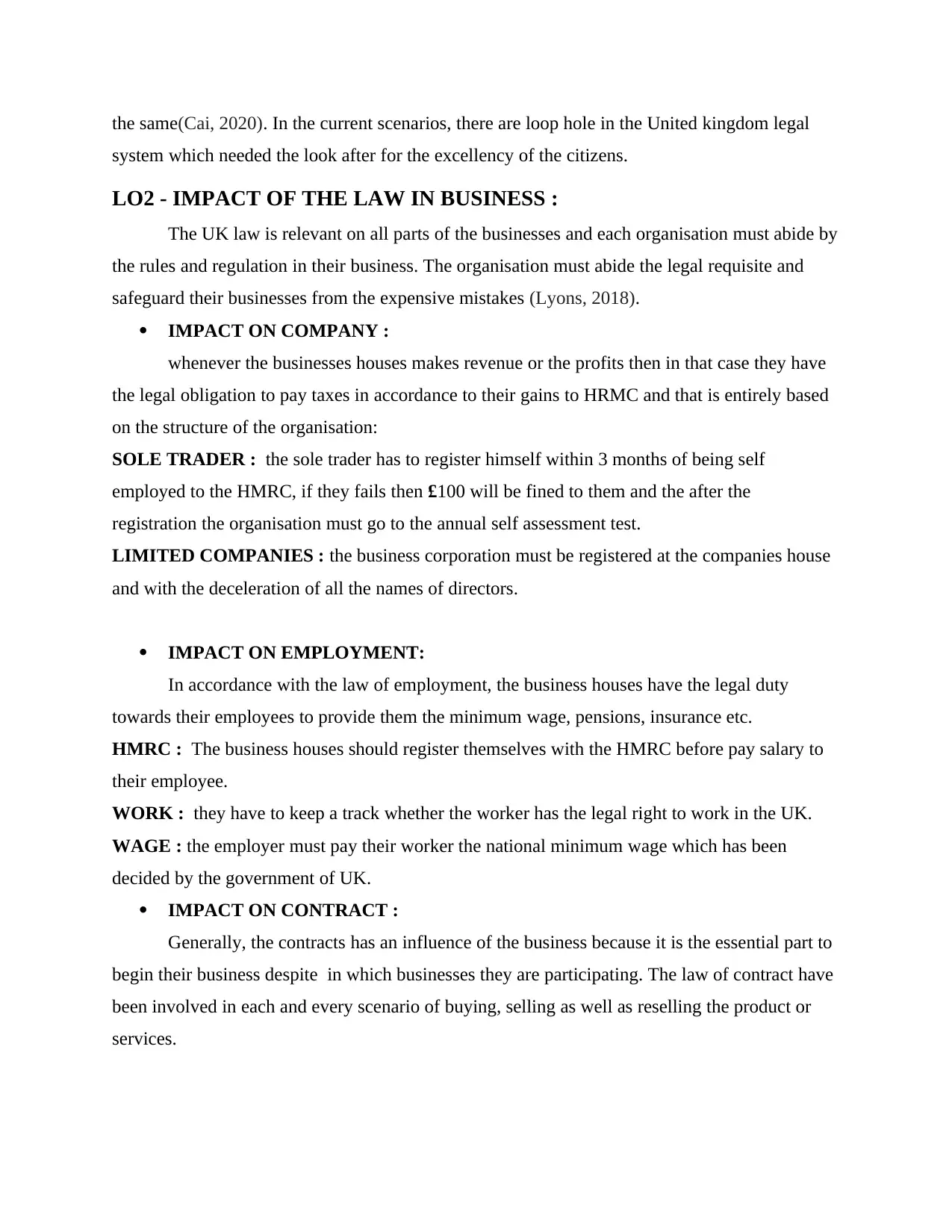
the same(Cai, 2020). In the current scenarios, there are loop hole in the United kingdom legal
system which needed the look after for the excellency of the citizens.
LO2 - IMPACT OF THE LAW IN BUSINESS :
The UK law is relevant on all parts of the businesses and each organisation must abide by
the rules and regulation in their business. The organisation must abide the legal requisite and
safeguard their businesses from the expensive mistakes (Lyons, 2018).
IMPACT ON COMPANY :
whenever the businesses houses makes revenue or the profits then in that case they have
the legal obligation to pay taxes in accordance to their gains to HRMC and that is entirely based
on the structure of the organisation:
SOLE TRADER : the sole trader has to register himself within 3 months of being self
employed to the HMRC, if they fails then £100 will be fined to them and the after the
registration the organisation must go to the annual self assessment test.
LIMITED COMPANIES : the business corporation must be registered at the companies house
and with the deceleration of all the names of directors.
IMPACT ON EMPLOYMENT:
In accordance with the law of employment, the business houses have the legal duty
towards their employees to provide them the minimum wage, pensions, insurance etc.
HMRC : The business houses should register themselves with the HMRC before pay salary to
their employee.
WORK : they have to keep a track whether the worker has the legal right to work in the UK.
WAGE : the employer must pay their worker the national minimum wage which has been
decided by the government of UK.
IMPACT ON CONTRACT :
Generally, the contracts has an influence of the business because it is the essential part to
begin their business despite in which businesses they are participating. The law of contract have
been involved in each and every scenario of buying, selling as well as reselling the product or
services.
system which needed the look after for the excellency of the citizens.
LO2 - IMPACT OF THE LAW IN BUSINESS :
The UK law is relevant on all parts of the businesses and each organisation must abide by
the rules and regulation in their business. The organisation must abide the legal requisite and
safeguard their businesses from the expensive mistakes (Lyons, 2018).
IMPACT ON COMPANY :
whenever the businesses houses makes revenue or the profits then in that case they have
the legal obligation to pay taxes in accordance to their gains to HRMC and that is entirely based
on the structure of the organisation:
SOLE TRADER : the sole trader has to register himself within 3 months of being self
employed to the HMRC, if they fails then £100 will be fined to them and the after the
registration the organisation must go to the annual self assessment test.
LIMITED COMPANIES : the business corporation must be registered at the companies house
and with the deceleration of all the names of directors.
IMPACT ON EMPLOYMENT:
In accordance with the law of employment, the business houses have the legal duty
towards their employees to provide them the minimum wage, pensions, insurance etc.
HMRC : The business houses should register themselves with the HMRC before pay salary to
their employee.
WORK : they have to keep a track whether the worker has the legal right to work in the UK.
WAGE : the employer must pay their worker the national minimum wage which has been
decided by the government of UK.
IMPACT ON CONTRACT :
Generally, the contracts has an influence of the business because it is the essential part to
begin their business despite in which businesses they are participating. The law of contract have
been involved in each and every scenario of buying, selling as well as reselling the product or
services.
Paraphrase This Document
Need a fresh take? Get an instant paraphrase of this document with our AI Paraphraser
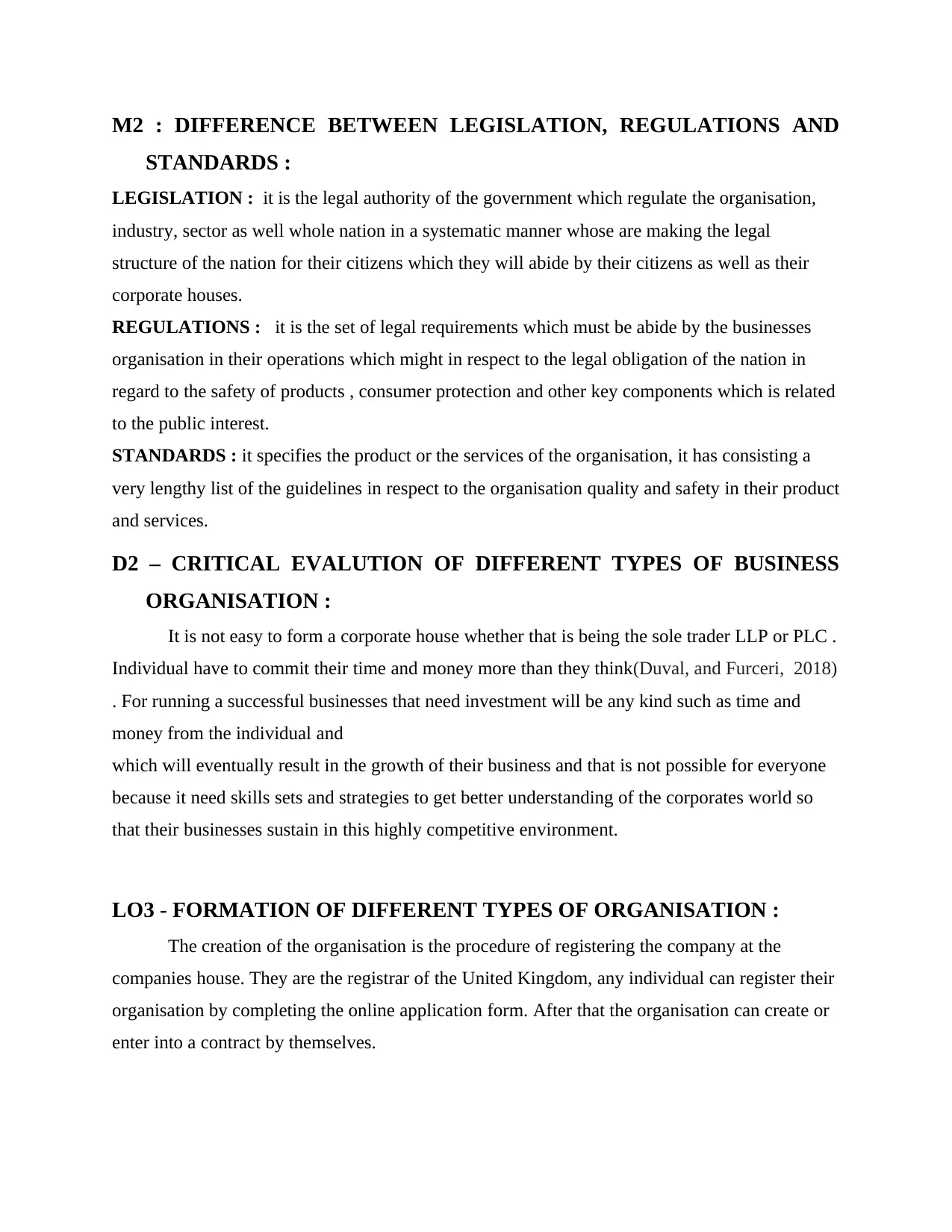
M2 : DIFFERENCE BETWEEN LEGISLATION, REGULATIONS AND
STANDARDS :
LEGISLATION : it is the legal authority of the government which regulate the organisation,
industry, sector as well whole nation in a systematic manner whose are making the legal
structure of the nation for their citizens which they will abide by their citizens as well as their
corporate houses.
REGULATIONS : it is the set of legal requirements which must be abide by the businesses
organisation in their operations which might in respect to the legal obligation of the nation in
regard to the safety of products , consumer protection and other key components which is related
to the public interest.
STANDARDS : it specifies the product or the services of the organisation, it has consisting a
very lengthy list of the guidelines in respect to the organisation quality and safety in their product
and services.
D2 – CRITICAL EVALUTION OF DIFFERENT TYPES OF BUSINESS
ORGANISATION :
It is not easy to form a corporate house whether that is being the sole trader LLP or PLC .
Individual have to commit their time and money more than they think(Duval, and Furceri, 2018)
. For running a successful businesses that need investment will be any kind such as time and
money from the individual and
which will eventually result in the growth of their business and that is not possible for everyone
because it need skills sets and strategies to get better understanding of the corporates world so
that their businesses sustain in this highly competitive environment.
LO3 - FORMATION OF DIFFERENT TYPES OF ORGANISATION :
The creation of the organisation is the procedure of registering the company at the
companies house. They are the registrar of the United Kingdom, any individual can register their
organisation by completing the online application form. After that the organisation can create or
enter into a contract by themselves.
STANDARDS :
LEGISLATION : it is the legal authority of the government which regulate the organisation,
industry, sector as well whole nation in a systematic manner whose are making the legal
structure of the nation for their citizens which they will abide by their citizens as well as their
corporate houses.
REGULATIONS : it is the set of legal requirements which must be abide by the businesses
organisation in their operations which might in respect to the legal obligation of the nation in
regard to the safety of products , consumer protection and other key components which is related
to the public interest.
STANDARDS : it specifies the product or the services of the organisation, it has consisting a
very lengthy list of the guidelines in respect to the organisation quality and safety in their product
and services.
D2 – CRITICAL EVALUTION OF DIFFERENT TYPES OF BUSINESS
ORGANISATION :
It is not easy to form a corporate house whether that is being the sole trader LLP or PLC .
Individual have to commit their time and money more than they think(Duval, and Furceri, 2018)
. For running a successful businesses that need investment will be any kind such as time and
money from the individual and
which will eventually result in the growth of their business and that is not possible for everyone
because it need skills sets and strategies to get better understanding of the corporates world so
that their businesses sustain in this highly competitive environment.
LO3 - FORMATION OF DIFFERENT TYPES OF ORGANISATION :
The creation of the organisation is the procedure of registering the company at the
companies house. They are the registrar of the United Kingdom, any individual can register their
organisation by completing the online application form. After that the organisation can create or
enter into a contract by themselves.
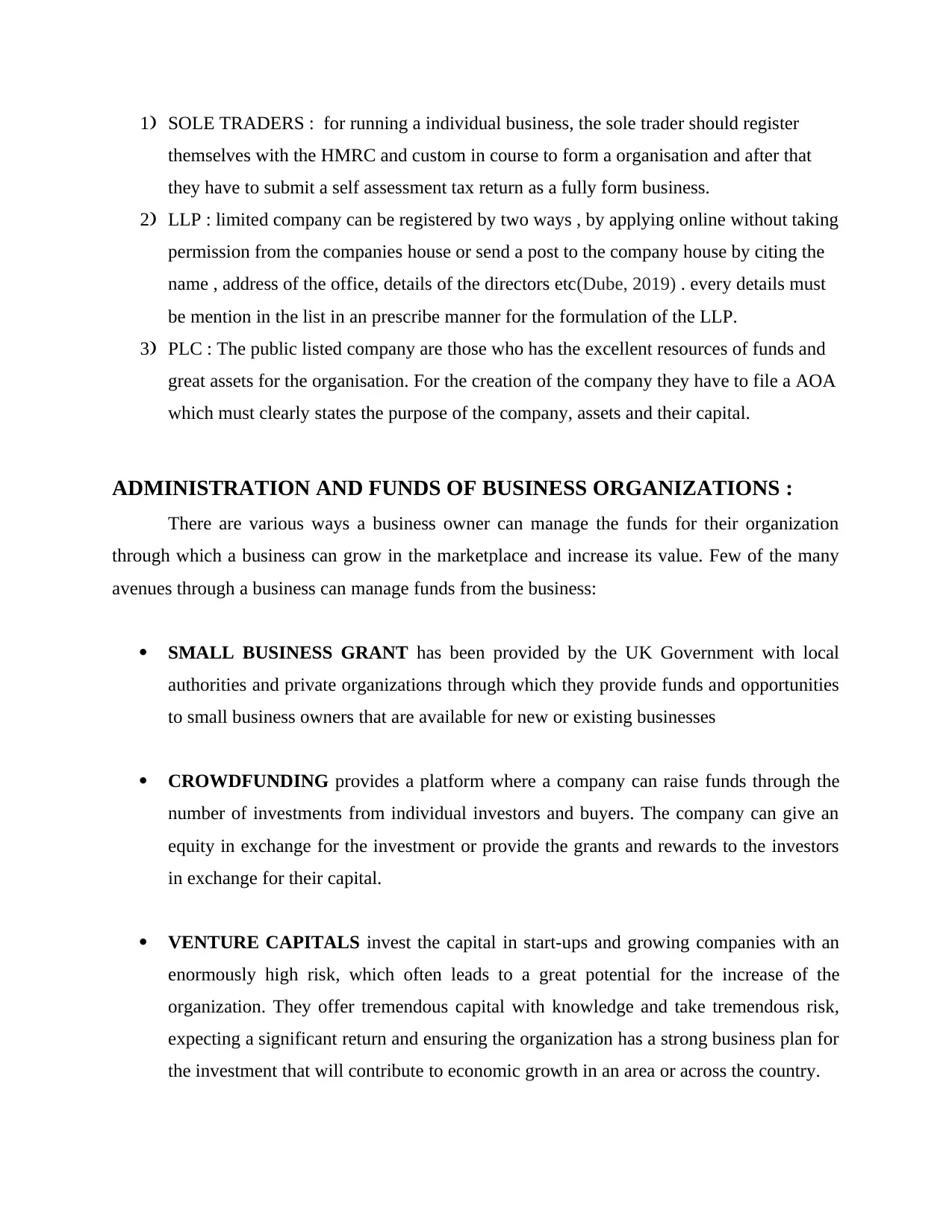
1) SOLE TRADERS : for running a individual business, the sole trader should register
themselves with the HMRC and custom in course to form a organisation and after that
they have to submit a self assessment tax return as a fully form business.
2) LLP : limited company can be registered by two ways , by applying online without taking
permission from the companies house or send a post to the company house by citing the
name , address of the office, details of the directors etc(Dube, 2019) . every details must
be mention in the list in an prescribe manner for the formulation of the LLP.
3) PLC : The public listed company are those who has the excellent resources of funds and
great assets for the organisation. For the creation of the company they have to file a AOA
which must clearly states the purpose of the company, assets and their capital.
ADMINISTRATION AND FUNDS OF BUSINESS ORGANIZATIONS :
There are various ways a business owner can manage the funds for their organization
through which a business can grow in the marketplace and increase its value. Few of the many
avenues through a business can manage funds from the business:
SMALL BUSINESS GRANT has been provided by the UK Government with local
authorities and private organizations through which they provide funds and opportunities
to small business owners that are available for new or existing businesses
CROWDFUNDING provides a platform where a company can raise funds through the
number of investments from individual investors and buyers. The company can give an
equity in exchange for the investment or provide the grants and rewards to the investors
in exchange for their capital.
VENTURE CAPITALS invest the capital in start-ups and growing companies with an
enormously high risk, which often leads to a great potential for the increase of the
organization. They offer tremendous capital with knowledge and take tremendous risk,
expecting a significant return and ensuring the organization has a strong business plan for
the investment that will contribute to economic growth in an area or across the country.
themselves with the HMRC and custom in course to form a organisation and after that
they have to submit a self assessment tax return as a fully form business.
2) LLP : limited company can be registered by two ways , by applying online without taking
permission from the companies house or send a post to the company house by citing the
name , address of the office, details of the directors etc(Dube, 2019) . every details must
be mention in the list in an prescribe manner for the formulation of the LLP.
3) PLC : The public listed company are those who has the excellent resources of funds and
great assets for the organisation. For the creation of the company they have to file a AOA
which must clearly states the purpose of the company, assets and their capital.
ADMINISTRATION AND FUNDS OF BUSINESS ORGANIZATIONS :
There are various ways a business owner can manage the funds for their organization
through which a business can grow in the marketplace and increase its value. Few of the many
avenues through a business can manage funds from the business:
SMALL BUSINESS GRANT has been provided by the UK Government with local
authorities and private organizations through which they provide funds and opportunities
to small business owners that are available for new or existing businesses
CROWDFUNDING provides a platform where a company can raise funds through the
number of investments from individual investors and buyers. The company can give an
equity in exchange for the investment or provide the grants and rewards to the investors
in exchange for their capital.
VENTURE CAPITALS invest the capital in start-ups and growing companies with an
enormously high risk, which often leads to a great potential for the increase of the
organization. They offer tremendous capital with knowledge and take tremendous risk,
expecting a significant return and ensuring the organization has a strong business plan for
the investment that will contribute to economic growth in an area or across the country.
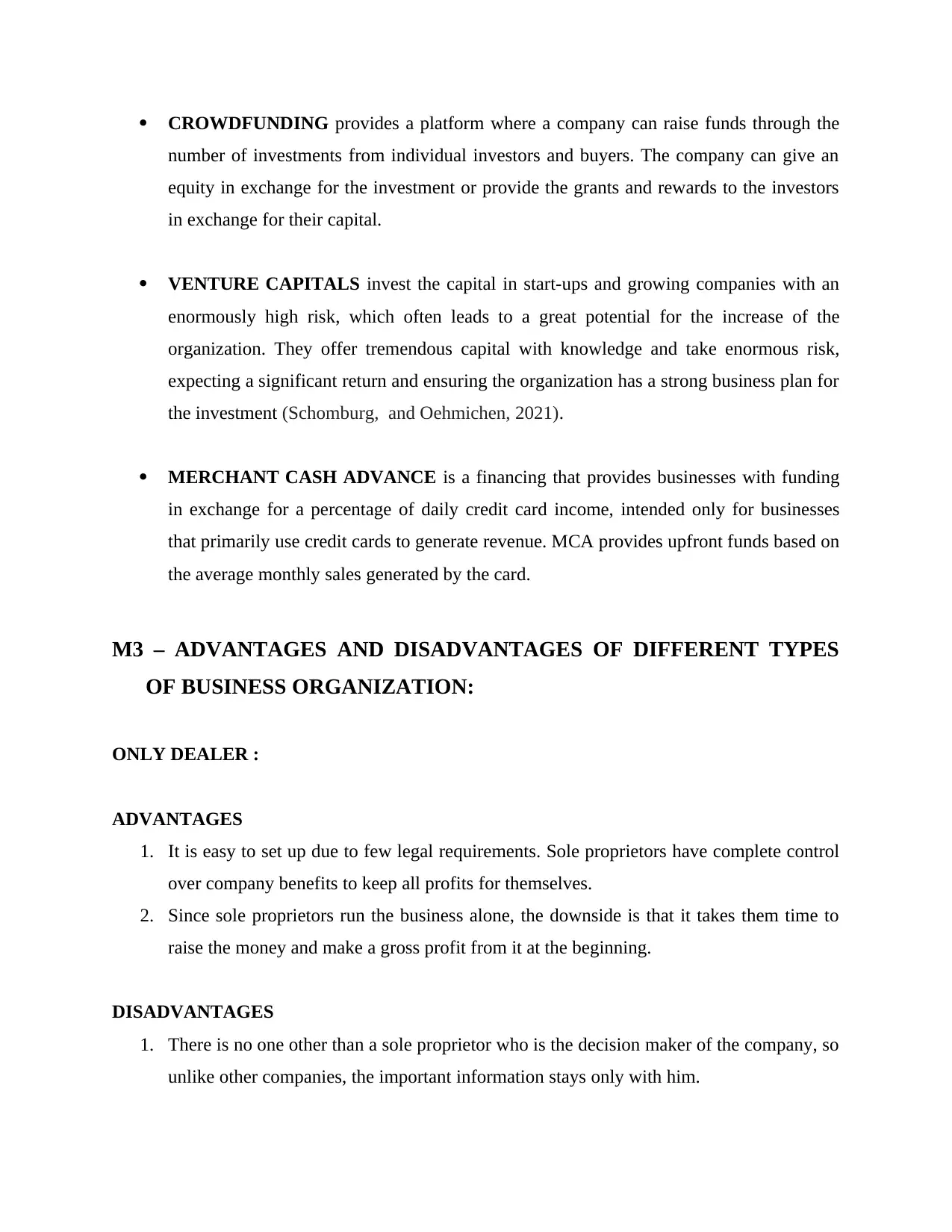
CROWDFUNDING provides a platform where a company can raise funds through the
number of investments from individual investors and buyers. The company can give an
equity in exchange for the investment or provide the grants and rewards to the investors
in exchange for their capital.
VENTURE CAPITALS invest the capital in start-ups and growing companies with an
enormously high risk, which often leads to a great potential for the increase of the
organization. They offer tremendous capital with knowledge and take enormous risk,
expecting a significant return and ensuring the organization has a strong business plan for
the investment (Schomburg, and Oehmichen, 2021).
MERCHANT CASH ADVANCE is a financing that provides businesses with funding
in exchange for a percentage of daily credit card income, intended only for businesses
that primarily use credit cards to generate revenue. MCA provides upfront funds based on
the average monthly sales generated by the card.
M3 – ADVANTAGES AND DISADVANTAGES OF DIFFERENT TYPES
OF BUSINESS ORGANIZATION:
ONLY DEALER :
ADVANTAGES
1. It is easy to set up due to few legal requirements. Sole proprietors have complete control
over company benefits to keep all profits for themselves.
2. Since sole proprietors run the business alone, the downside is that it takes them time to
raise the money and make a gross profit from it at the beginning.
DISADVANTAGES
1. There is no one other than a sole proprietor who is the decision maker of the company, so
unlike other companies, the important information stays only with him.
number of investments from individual investors and buyers. The company can give an
equity in exchange for the investment or provide the grants and rewards to the investors
in exchange for their capital.
VENTURE CAPITALS invest the capital in start-ups and growing companies with an
enormously high risk, which often leads to a great potential for the increase of the
organization. They offer tremendous capital with knowledge and take enormous risk,
expecting a significant return and ensuring the organization has a strong business plan for
the investment (Schomburg, and Oehmichen, 2021).
MERCHANT CASH ADVANCE is a financing that provides businesses with funding
in exchange for a percentage of daily credit card income, intended only for businesses
that primarily use credit cards to generate revenue. MCA provides upfront funds based on
the average monthly sales generated by the card.
M3 – ADVANTAGES AND DISADVANTAGES OF DIFFERENT TYPES
OF BUSINESS ORGANIZATION:
ONLY DEALER :
ADVANTAGES
1. It is easy to set up due to few legal requirements. Sole proprietors have complete control
over company benefits to keep all profits for themselves.
2. Since sole proprietors run the business alone, the downside is that it takes them time to
raise the money and make a gross profit from it at the beginning.
DISADVANTAGES
1. There is no one other than a sole proprietor who is the decision maker of the company, so
unlike other companies, the important information stays only with him.
Secure Best Marks with AI Grader
Need help grading? Try our AI Grader for instant feedback on your assignments.
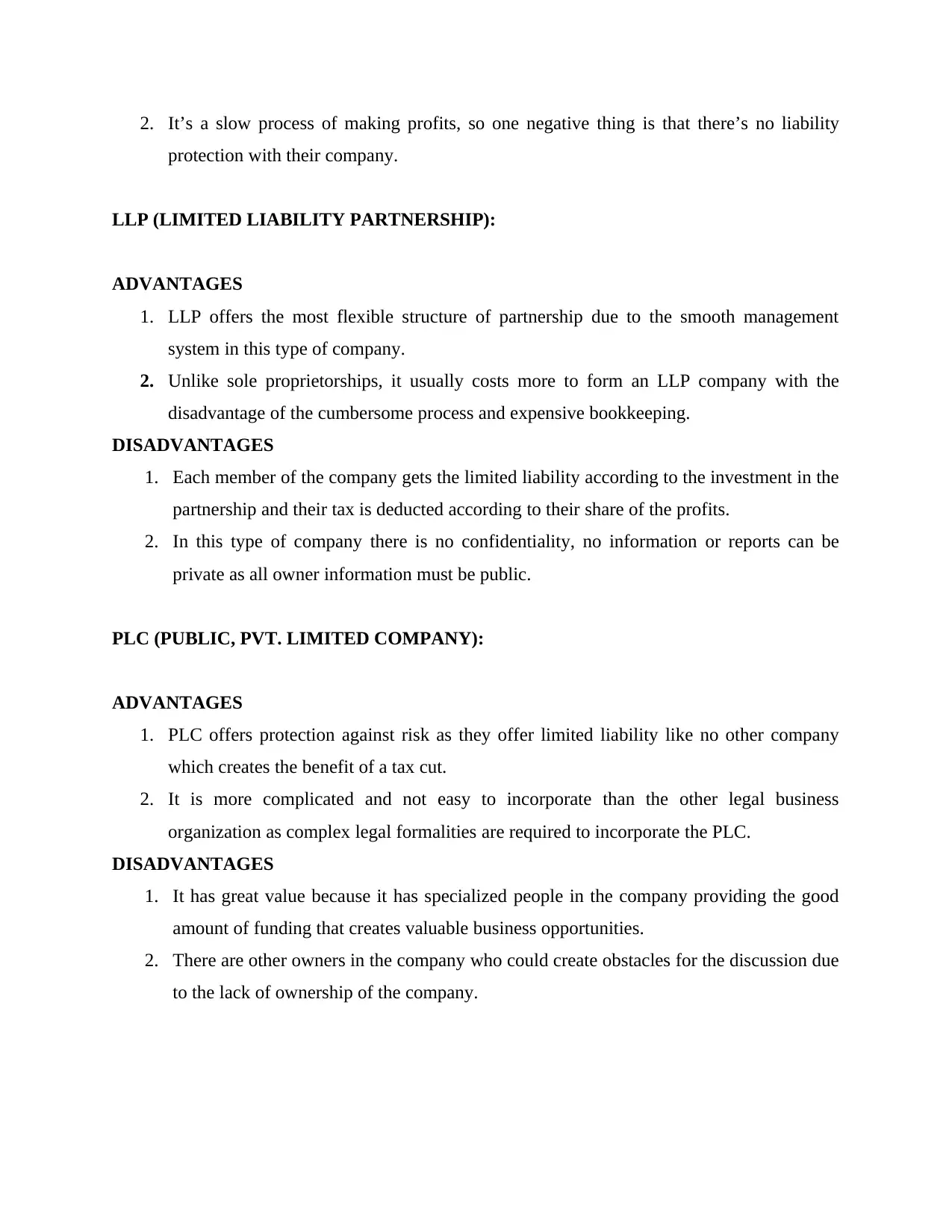
2. It’s a slow process of making profits, so one negative thing is that there’s no liability
protection with their company.
LLP (LIMITED LIABILITY PARTNERSHIP):
ADVANTAGES
1. LLP offers the most flexible structure of partnership due to the smooth management
system in this type of company.
2. Unlike sole proprietorships, it usually costs more to form an LLP company with the
disadvantage of the cumbersome process and expensive bookkeeping.
DISADVANTAGES
1. Each member of the company gets the limited liability according to the investment in the
partnership and their tax is deducted according to their share of the profits.
2. In this type of company there is no confidentiality, no information or reports can be
private as all owner information must be public.
PLC (PUBLIC, PVT. LIMITED COMPANY):
ADVANTAGES
1. PLC offers protection against risk as they offer limited liability like no other company
which creates the benefit of a tax cut.
2. It is more complicated and not easy to incorporate than the other legal business
organization as complex legal formalities are required to incorporate the PLC.
DISADVANTAGES
1. It has great value because it has specialized people in the company providing the good
amount of funding that creates valuable business opportunities.
2. There are other owners in the company who could create obstacles for the discussion due
to the lack of ownership of the company.
protection with their company.
LLP (LIMITED LIABILITY PARTNERSHIP):
ADVANTAGES
1. LLP offers the most flexible structure of partnership due to the smooth management
system in this type of company.
2. Unlike sole proprietorships, it usually costs more to form an LLP company with the
disadvantage of the cumbersome process and expensive bookkeeping.
DISADVANTAGES
1. Each member of the company gets the limited liability according to the investment in the
partnership and their tax is deducted according to their share of the profits.
2. In this type of company there is no confidentiality, no information or reports can be
private as all owner information must be public.
PLC (PUBLIC, PVT. LIMITED COMPANY):
ADVANTAGES
1. PLC offers protection against risk as they offer limited liability like no other company
which creates the benefit of a tax cut.
2. It is more complicated and not easy to incorporate than the other legal business
organization as complex legal formalities are required to incorporate the PLC.
DISADVANTAGES
1. It has great value because it has specialized people in the company providing the good
amount of funding that creates valuable business opportunities.
2. There are other owners in the company who could create obstacles for the discussion due
to the lack of ownership of the company.
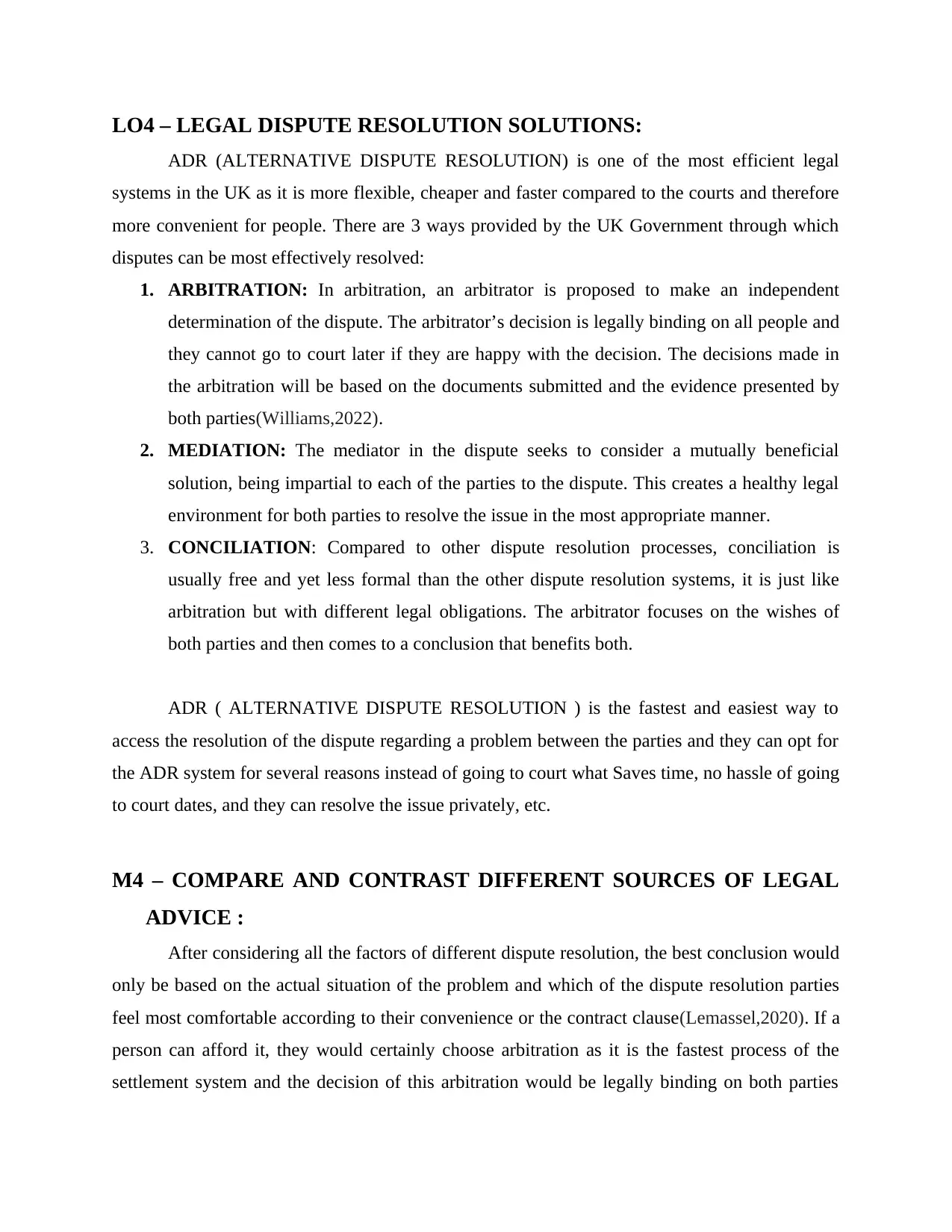
LO4 – LEGAL DISPUTE RESOLUTION SOLUTIONS:
ADR (ALTERNATIVE DISPUTE RESOLUTION) is one of the most efficient legal
systems in the UK as it is more flexible, cheaper and faster compared to the courts and therefore
more convenient for people. There are 3 ways provided by the UK Government through which
disputes can be most effectively resolved:
1. ARBITRATION: In arbitration, an arbitrator is proposed to make an independent
determination of the dispute. The arbitrator’s decision is legally binding on all people and
they cannot go to court later if they are happy with the decision. The decisions made in
the arbitration will be based on the documents submitted and the evidence presented by
both parties(Williams,2022).
2. MEDIATION: The mediator in the dispute seeks to consider a mutually beneficial
solution, being impartial to each of the parties to the dispute. This creates a healthy legal
environment for both parties to resolve the issue in the most appropriate manner.
3. CONCILIATION: Compared to other dispute resolution processes, conciliation is
usually free and yet less formal than the other dispute resolution systems, it is just like
arbitration but with different legal obligations. The arbitrator focuses on the wishes of
both parties and then comes to a conclusion that benefits both.
ADR ( ALTERNATIVE DISPUTE RESOLUTION ) is the fastest and easiest way to
access the resolution of the dispute regarding a problem between the parties and they can opt for
the ADR system for several reasons instead of going to court what Saves time, no hassle of going
to court dates, and they can resolve the issue privately, etc.
M4 – COMPARE AND CONTRAST DIFFERENT SOURCES OF LEGAL
ADVICE :
After considering all the factors of different dispute resolution, the best conclusion would
only be based on the actual situation of the problem and which of the dispute resolution parties
feel most comfortable according to their convenience or the contract clause(Lemassel,2020). If a
person can afford it, they would certainly choose arbitration as it is the fastest process of the
settlement system and the decision of this arbitration would be legally binding on both parties
ADR (ALTERNATIVE DISPUTE RESOLUTION) is one of the most efficient legal
systems in the UK as it is more flexible, cheaper and faster compared to the courts and therefore
more convenient for people. There are 3 ways provided by the UK Government through which
disputes can be most effectively resolved:
1. ARBITRATION: In arbitration, an arbitrator is proposed to make an independent
determination of the dispute. The arbitrator’s decision is legally binding on all people and
they cannot go to court later if they are happy with the decision. The decisions made in
the arbitration will be based on the documents submitted and the evidence presented by
both parties(Williams,2022).
2. MEDIATION: The mediator in the dispute seeks to consider a mutually beneficial
solution, being impartial to each of the parties to the dispute. This creates a healthy legal
environment for both parties to resolve the issue in the most appropriate manner.
3. CONCILIATION: Compared to other dispute resolution processes, conciliation is
usually free and yet less formal than the other dispute resolution systems, it is just like
arbitration but with different legal obligations. The arbitrator focuses on the wishes of
both parties and then comes to a conclusion that benefits both.
ADR ( ALTERNATIVE DISPUTE RESOLUTION ) is the fastest and easiest way to
access the resolution of the dispute regarding a problem between the parties and they can opt for
the ADR system for several reasons instead of going to court what Saves time, no hassle of going
to court dates, and they can resolve the issue privately, etc.
M4 – COMPARE AND CONTRAST DIFFERENT SOURCES OF LEGAL
ADVICE :
After considering all the factors of different dispute resolution, the best conclusion would
only be based on the actual situation of the problem and which of the dispute resolution parties
feel most comfortable according to their convenience or the contract clause(Lemassel,2020). If a
person can afford it, they would certainly choose arbitration as it is the fastest process of the
settlement system and the decision of this arbitration would be legally binding on both parties

and neither of them can appeal or go to court regardless of whether they are satisfied or not with
the decisions of the referee. Some may prefer the mediation process as it is impartial and the
mediator tries to reach a conclusion where the decision benefits both parties and few may opt for
the arbitration process as it is sometimes free, less formal and the main factor unlike arbitration,
if one of the parties is not satisfied with the decision they may choose to take the matter to court.
D3 – EFFECTIVENESS OF THE LEGAL SYSTEM:
The legal system has different ways to get justice, but compared to the court, ADR is the
most effective way to resolve the issue between two parties and it is also time consuming. People
should opt for Alternative Dispute Resolution if they want to save their time and the second most
important reason is that they do not want them or their company to be reprimanded in public as it
is risky for their company’s reputation and their own self-image could be just as would be at
stake of the people(Glazer,2021).
CONCLUSION
The report concludes that the UK legal system has various complex areas that can be both
very easy to understand and the most confusing in the world. It totally depends on the factual
statements of the situation which are the precedents of the court and the whole legal system of
the UK is based only on that. Previous judgments are the primary unit of judgment in any case
and they are important to the country’s legal systems.
The country’s business entities also have legal obligations, regardless of whether a
company is run by a sole proprietorship, a limited liability company or a joint-stock company,
everyone must be sure of the legality of their business, otherwise their organization could face
the risk of a serious one loss of investments.
In order to seek justice instead of going to court there are other legal entities in the UK
namely ADR (ALTERNATIVE DISPUTE RESOLUTION) through which a person can obtain
justice quickly and resolve the issue quickly, regardless of whether they are filing a dispute
Arbitration, mediation or arbitration decides – it all depends on the respective situation of the
parties.
the decisions of the referee. Some may prefer the mediation process as it is impartial and the
mediator tries to reach a conclusion where the decision benefits both parties and few may opt for
the arbitration process as it is sometimes free, less formal and the main factor unlike arbitration,
if one of the parties is not satisfied with the decision they may choose to take the matter to court.
D3 – EFFECTIVENESS OF THE LEGAL SYSTEM:
The legal system has different ways to get justice, but compared to the court, ADR is the
most effective way to resolve the issue between two parties and it is also time consuming. People
should opt for Alternative Dispute Resolution if they want to save their time and the second most
important reason is that they do not want them or their company to be reprimanded in public as it
is risky for their company’s reputation and their own self-image could be just as would be at
stake of the people(Glazer,2021).
CONCLUSION
The report concludes that the UK legal system has various complex areas that can be both
very easy to understand and the most confusing in the world. It totally depends on the factual
statements of the situation which are the precedents of the court and the whole legal system of
the UK is based only on that. Previous judgments are the primary unit of judgment in any case
and they are important to the country’s legal systems.
The country’s business entities also have legal obligations, regardless of whether a
company is run by a sole proprietorship, a limited liability company or a joint-stock company,
everyone must be sure of the legality of their business, otherwise their organization could face
the risk of a serious one loss of investments.
In order to seek justice instead of going to court there are other legal entities in the UK
namely ADR (ALTERNATIVE DISPUTE RESOLUTION) through which a person can obtain
justice quickly and resolve the issue quickly, regardless of whether they are filing a dispute
Arbitration, mediation or arbitration decides – it all depends on the respective situation of the
parties.
Paraphrase This Document
Need a fresh take? Get an instant paraphrase of this document with our AI Paraphraser
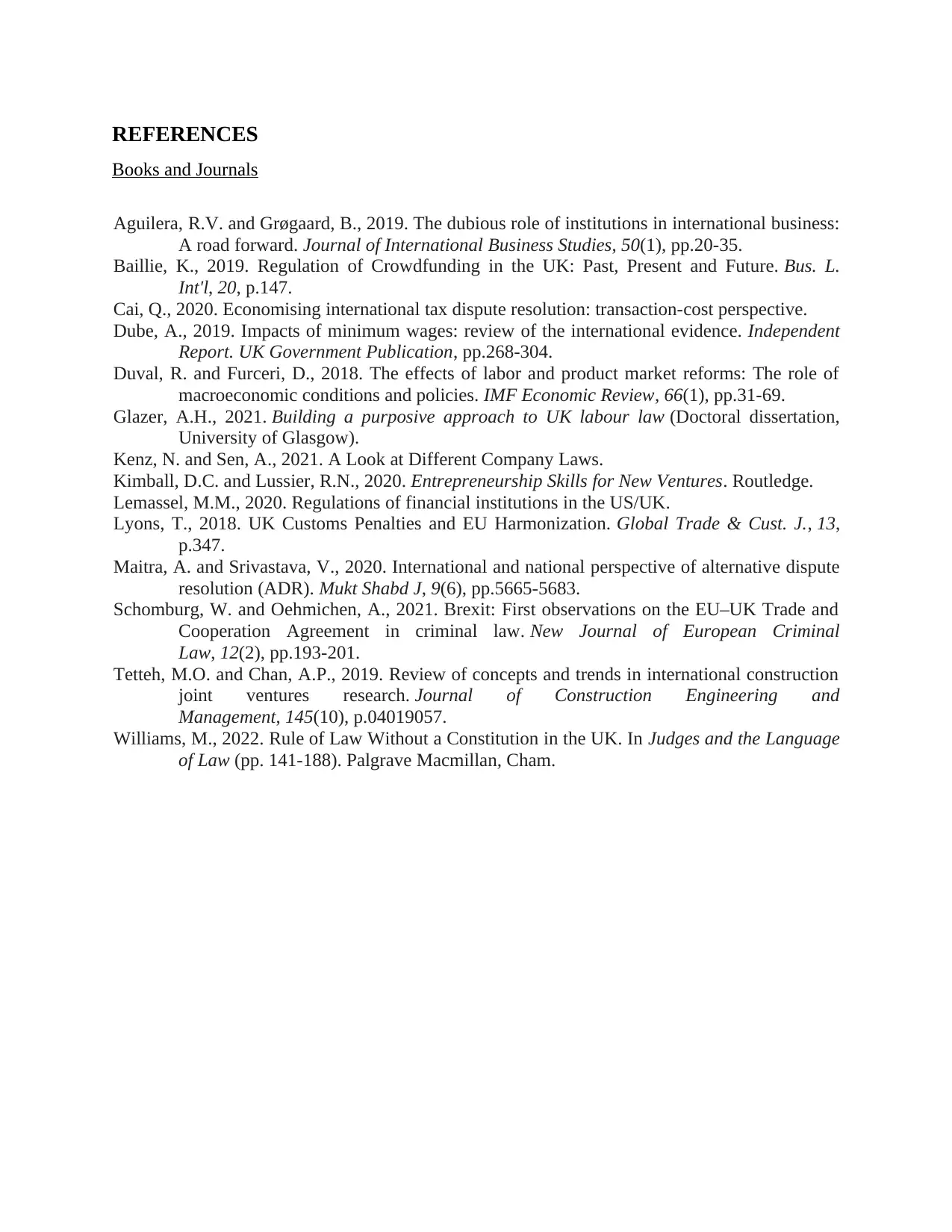
REFERENCES
Books and Journals
Aguilera, R.V. and Grøgaard, B., 2019. The dubious role of institutions in international business:
A road forward. Journal of International Business Studies, 50(1), pp.20-35.
Baillie, K., 2019. Regulation of Crowdfunding in the UK: Past, Present and Future. Bus. L.
Int'l, 20, p.147.
Cai, Q., 2020. Economising international tax dispute resolution: transaction-cost perspective.
Dube, A., 2019. Impacts of minimum wages: review of the international evidence. Independent
Report. UK Government Publication, pp.268-304.
Duval, R. and Furceri, D., 2018. The effects of labor and product market reforms: The role of
macroeconomic conditions and policies. IMF Economic Review, 66(1), pp.31-69.
Glazer, A.H., 2021. Building a purposive approach to UK labour law (Doctoral dissertation,
University of Glasgow).
Kenz, N. and Sen, A., 2021. A Look at Different Company Laws.
Kimball, D.C. and Lussier, R.N., 2020. Entrepreneurship Skills for New Ventures. Routledge.
Lemassel, M.M., 2020. Regulations of financial institutions in the US/UK.
Lyons, T., 2018. UK Customs Penalties and EU Harmonization. Global Trade & Cust. J., 13,
p.347.
Maitra, A. and Srivastava, V., 2020. International and national perspective of alternative dispute
resolution (ADR). Mukt Shabd J, 9(6), pp.5665-5683.
Schomburg, W. and Oehmichen, A., 2021. Brexit: First observations on the EU–UK Trade and
Cooperation Agreement in criminal law. New Journal of European Criminal
Law, 12(2), pp.193-201.
Tetteh, M.O. and Chan, A.P., 2019. Review of concepts and trends in international construction
joint ventures research. Journal of Construction Engineering and
Management, 145(10), p.04019057.
Williams, M., 2022. Rule of Law Without a Constitution in the UK. In Judges and the Language
of Law (pp. 141-188). Palgrave Macmillan, Cham.
Books and Journals
Aguilera, R.V. and Grøgaard, B., 2019. The dubious role of institutions in international business:
A road forward. Journal of International Business Studies, 50(1), pp.20-35.
Baillie, K., 2019. Regulation of Crowdfunding in the UK: Past, Present and Future. Bus. L.
Int'l, 20, p.147.
Cai, Q., 2020. Economising international tax dispute resolution: transaction-cost perspective.
Dube, A., 2019. Impacts of minimum wages: review of the international evidence. Independent
Report. UK Government Publication, pp.268-304.
Duval, R. and Furceri, D., 2018. The effects of labor and product market reforms: The role of
macroeconomic conditions and policies. IMF Economic Review, 66(1), pp.31-69.
Glazer, A.H., 2021. Building a purposive approach to UK labour law (Doctoral dissertation,
University of Glasgow).
Kenz, N. and Sen, A., 2021. A Look at Different Company Laws.
Kimball, D.C. and Lussier, R.N., 2020. Entrepreneurship Skills for New Ventures. Routledge.
Lemassel, M.M., 2020. Regulations of financial institutions in the US/UK.
Lyons, T., 2018. UK Customs Penalties and EU Harmonization. Global Trade & Cust. J., 13,
p.347.
Maitra, A. and Srivastava, V., 2020. International and national perspective of alternative dispute
resolution (ADR). Mukt Shabd J, 9(6), pp.5665-5683.
Schomburg, W. and Oehmichen, A., 2021. Brexit: First observations on the EU–UK Trade and
Cooperation Agreement in criminal law. New Journal of European Criminal
Law, 12(2), pp.193-201.
Tetteh, M.O. and Chan, A.P., 2019. Review of concepts and trends in international construction
joint ventures research. Journal of Construction Engineering and
Management, 145(10), p.04019057.
Williams, M., 2022. Rule of Law Without a Constitution in the UK. In Judges and the Language
of Law (pp. 141-188). Palgrave Macmillan, Cham.
1 out of 14
Related Documents
Your All-in-One AI-Powered Toolkit for Academic Success.
+13062052269
info@desklib.com
Available 24*7 on WhatsApp / Email
![[object Object]](/_next/static/media/star-bottom.7253800d.svg)
Unlock your academic potential
© 2024 | Zucol Services PVT LTD | All rights reserved.



